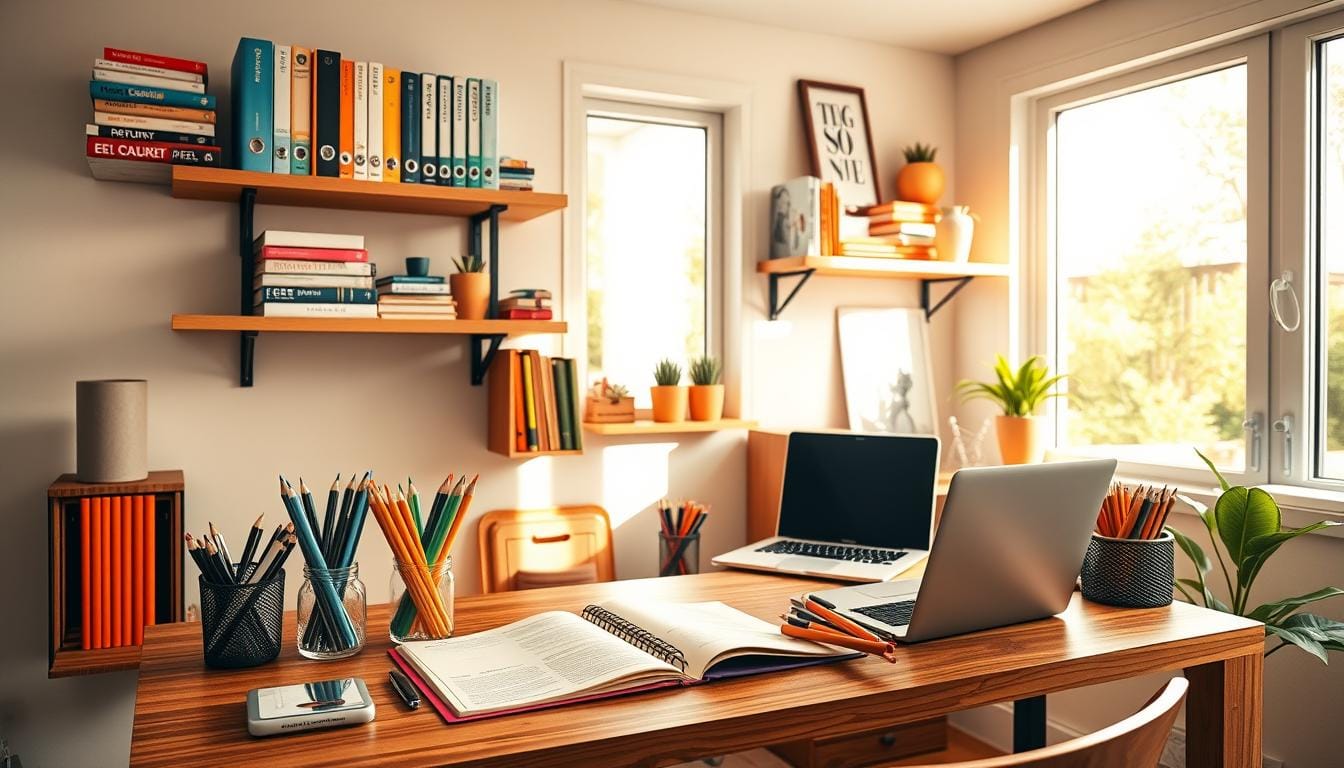As the new school year comes, I enjoy making my home welcoming and organized for my kids. This tradition gets them excited and helps them stay focused all year.
Creating a good learning space is key. With the right decor and organization ideas, you can make a big impact. In this article, we’ll share 10 easy tips to help you begin!
We’ll cover everything from smart storage to inspiring decor. Let’s start getting your home ready for the new school year!
Assess Your Space and Needs
Before starting with back-to-school decor and organization, assess your space and needs. This step is key to creating a functional and inspiring learning area.
First, examine the area for studying or homework. Look at the room’s size, layout, and any furniture or decor. Think about how to make this space work best for you.
Identify Space Limitations
It’s important to know your space’s limits. Measure your study area and note any challenges, like:
- Narrow aisles
- Limited wall space
- Outdated or bulky furniture
Knowing these limits helps you find ways to improve your space. This makes it both functional and comfortable.
Determine Storage Requirements
Then, think about what storage you need. Consider the school supplies you’ll have, such as:
- Books and binders
- Writing utensils and paper
- Electronic devices and cables
Check if your current storage meets your needs. You might need more, like shelves or drawer organizers, to keep things organized.
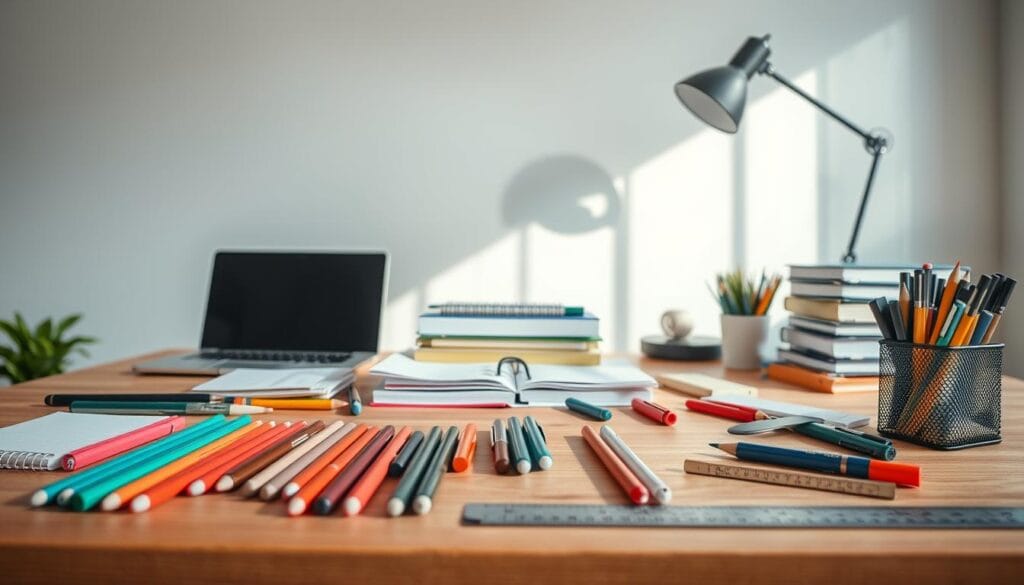
By understanding your space and needs, you can set up a great study area. It will help you stay productive and succeed, whether in a college bedroom or a student desk.
Choose a Color Scheme
Choosing a color scheme is key to making a classroom welcoming. The colors you pick can really affect how students feel and work.
For classroom decor, the right colors can boost creativity and focus. Let’s look at some popular color trends that can make learning better.
Popular Color Trends for Classrooms
Calming colors like light blue, pale green, and beige are great for classrooms. They help students relax and focus better. But, colors like orange and yellow can make students more creative and energetic.
- Soft blues and greens for a calming effect
- Vibrant oranges and yellows for energy and creativity
- Neutral tones like beige and gray for versatility
Combining Patterns and Textures
Mixing different patterns and textures can make your classroom more interesting. For school organization ideas, think about adding:
- Geometric patterns for a modern look
- Natural textures like wood and plants for warmth
- Colorful rugs and curtains to tie the room together
For more ideas on making your space look good, check out some home decor ideas aesthetic that work well in classrooms.
Just like in dorm room organization tips, it’s important to mix looks with function. Make sure your colors and decor don’t make the room too busy or take away from learning.
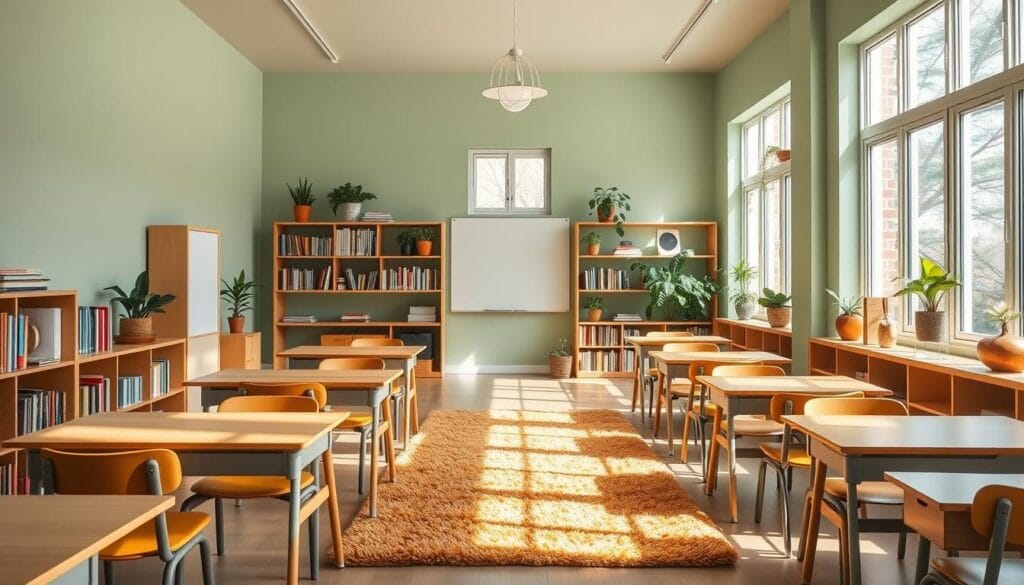
DIY Bulletin Boards
Let’s get creative with DIY bulletin boards to make your space engaging. A bulletin board that shows your personality or teaching style can make your classroom or study area more inviting and interactive.
Materials You’ll Need
To start, you’ll need some basic materials. These include:
- Colored paper or cardstock
- Markers or colored pencils
- Push pins or a staple gun
- Scissors
- Glue or a glue stick
- Other decorative items like stickers, washi tape, or ribbons
Having these materials ready will help you bring your ideas to life. You can create a DIY bulletin board that’s both functional and visually appealing.
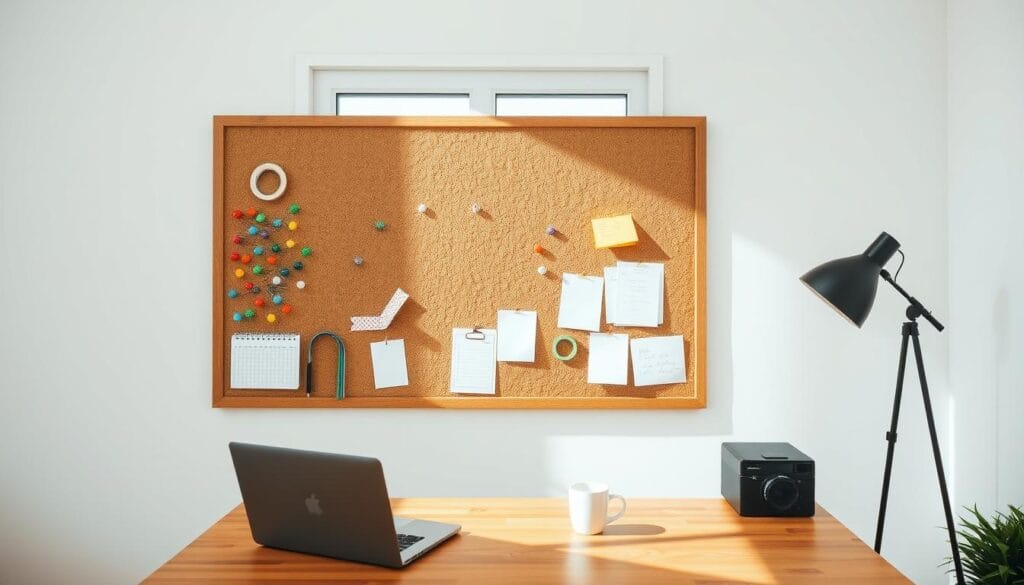
Creative Board Themes to Consider
When it comes to themes, the possibilities are endless! Here are a few ideas to get you started:
- Alphabet or Number Line: Perfect for younger students, these themes can help with learning and recognition.
- Seasonal or Holiday Themes: Keep your bulletin board fresh by changing it up with the seasons or holidays.
- Inspirational Quotes: Motivate your students with uplifting quotes or messages.
- Student Work Showcase: Encourage students by displaying their work or projects.
By choosing a theme that resonates with your students or personal style, you can create a classroom organization system that’s both effective and engaging.
Remember, the key to a great DIY bulletin board is to have fun and be creative! Experiment with different materials and themes until you find the perfect combination for your space.
Organize Your Study Area
Organizing your study area is more than just keeping things tidy. It’s about making a space that helps you learn better. A well-organized study area can really boost your productivity and focus. By using smart organization strategies, you can make sure your study area helps you succeed in school.
Desk Organization Tips
To keep your desk tidy, think about using desk organizers for your supplies. You can have trays for pens and pencils, a paper tray for important papers, and a small container for sticky notes and reminders.
- Use a desk calendar or planner to stay on top of assignments and deadlines.
- Keep supplies you use often within easy reach.
- Use a cord organizer to manage cables and headphones.
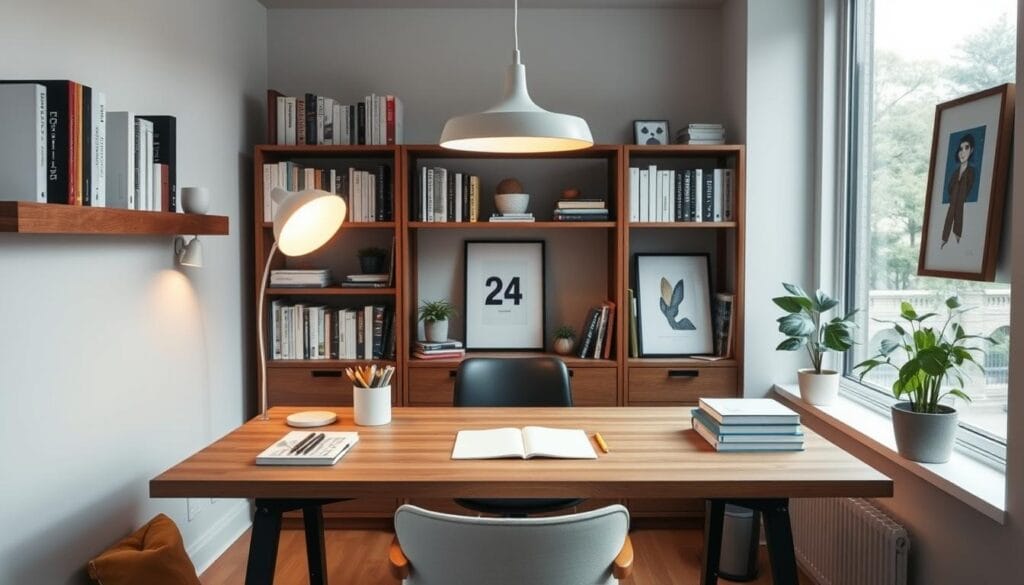
Use of Binders and Folders
Binders and folders are key for keeping your schoolwork in order. Use binders for bigger documents and folders for sorting.
Tips for Using Binders and Folders:
- Make sure to label each binder and folder clearly so you can find them easily.
- Organize your documents either by date or by subject.
- Take the time to clean out your binders and folders regularly to get rid of papers you don’t need.
By following these desk organization ideas and using binders and folders wisely, you can keep your study area clean and productive. This will help you reach your academic goals.
Implement Functional Storage Solutions
Right storage solutions are key to keeping school supplies tidy. A clean and organized space boosts productivity and focus. It also looks better.
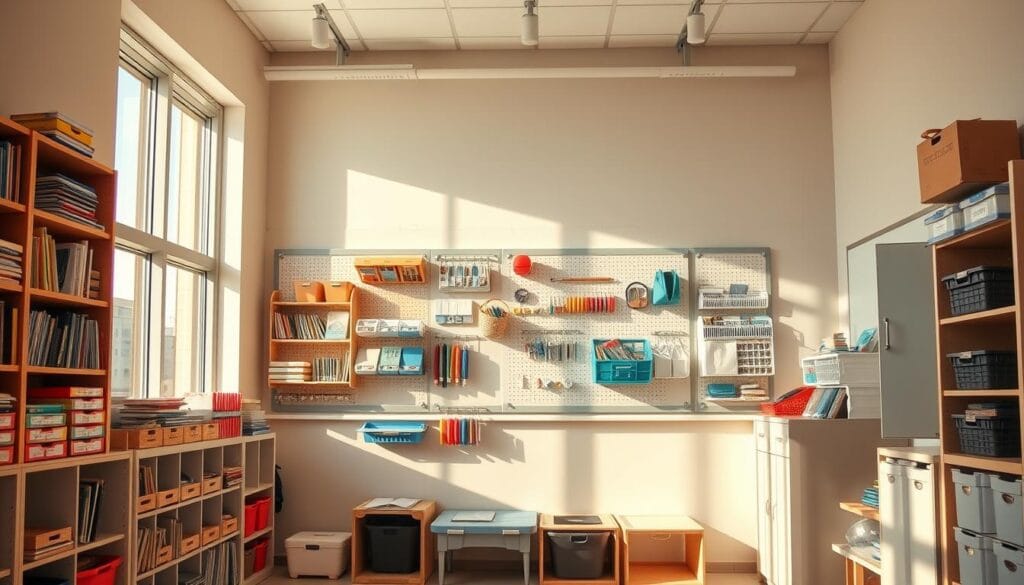
Shelving Ideas for School Supplies
Shelving is a smart way to store school supplies. It keeps them in sight and within reach. For small spaces, try wall-mounted shelves or stackable units.
Old bookcases or crates can also be repurposed for storage. For more ideas, see these 14 classroom storage ideas.
Storage Bins vs. Drawer Units
Choosing between storage bins and drawer units depends on your needs and space. Bins are perfect for toys, art, or bulk items. Drawer units are better for pens, pencils, and paper clips.
In dorm rooms or small areas, use under-bed bins or compact drawers. They keep things hidden but still reachable. For more ideas, check out living room storage solutions.
The ideal storage solution is both functional and stylish. It makes your space beautiful and organized. With the right shelving, bins, or drawers, you’ll create a productive and creative learning environment.
Create a Homework Station
Setting up a homework station is simpler than you might think. A dedicated study area can boost productivity and learning. Let’s explore the key elements for a successful homework station.
Essential Supplies for Success
To begin, gather basic supplies for an organized and effective homework station. Here are the must-haves:
- A comfortable and ergonomic chair
- A spacious desk or study table
- Good lighting, preferably natural or a high-quality desk lamp
- Storage bins or baskets for supplies and paperwork
- A bulletin board or whiteboard for notes and reminders
These essential supplies create a learning environment that encourages focus and creativity.
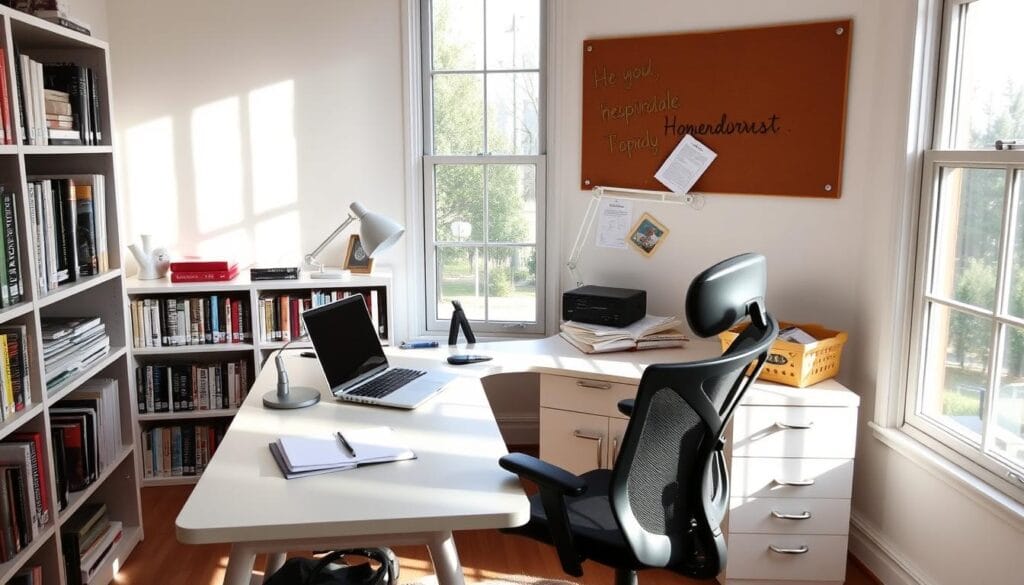
Tips for Designing an Inspiring Space
With the basics in place, let’s focus on making your homework station inspiring. Here are some tips:
- Personalize the space with your favorite colors, artwork, or motivational quotes.
- Keep the space organized with regular cleaning and decluttering sessions.
- Use a vision board or a goal-setting chart to stay motivated and focused.
- Incorporate plants or greenery to enhance the ambiance and air quality.
By following these design tips, you can turn your homework station into a place that sparks learning and creativity.
Creating a homework station is more than just functionality. It’s about building a space that supports your child’s educational path. By combining essential supplies with inspiring design, you can make a study area that’s both effective and fun.
Use Wall Space Wisely
Maximizing wall space can change your classroom for the better. It makes the room both functional and motivating. By decorating and organizing your walls smartly, you boost both looks and use.
Wall Art Ideas for Educational Motivation
Educational wall art is great for motivating students. Think about using inspiring quotes, educational posters, or a big, interactive periodic table. You can also make a vision board with your students. It shows their goals and dreams.
- Inspirational quotes to motivate students
- Educational posters on various subjects
- Interactive elements like a large periodic table
- Student-created vision boards
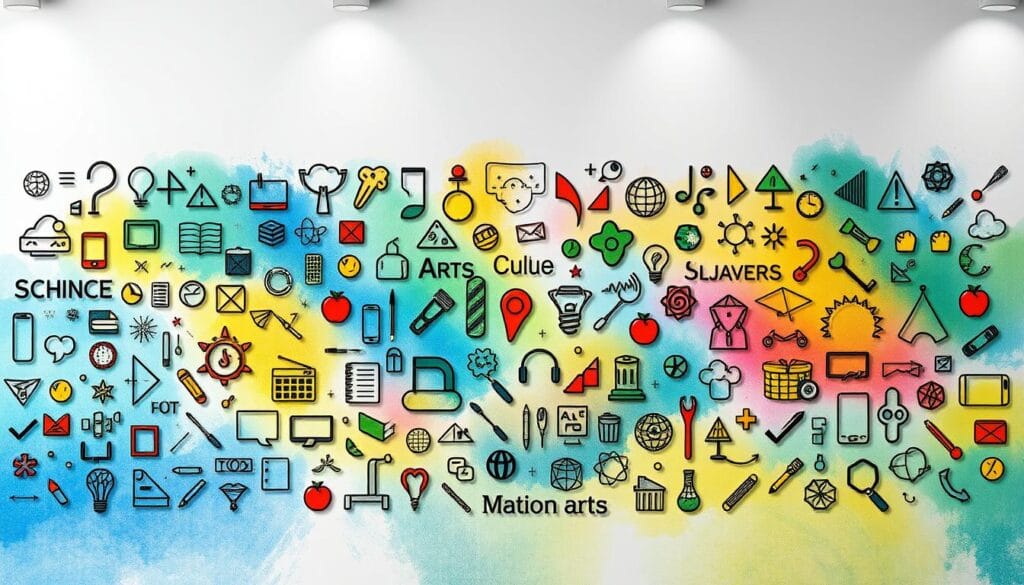
Hanging Organizers for School Necessities
Hanging organizers keep school supplies and materials handy. Use over-the-door organizers, hanging file folders, or pegboards with hooks and bins. This keeps your classroom neat and organized.
- Over-the-door organizers for storing supplies
- Hanging file folders for important documents
- Pegboards with hooks and bins for customizable storage
With these ideas, you can make a classroom that inspires and is well-organized. You’ll make the most of your wall space.
Personalize Your Decor
Creating a personalized space is more than just looks. It’s about making a place that feels welcoming and inspiring. This can really help a student’s motivation and learning experience.
Adding Student Photos and Artwork
Displaying student photos and artwork is a great way to make your classroom or study area special. It celebrates students’ efforts and creativity. Here are some ideas to get you started:
- Gallery Wall: Make a gallery wall with student artwork, photos, and projects. Use frames of different shapes and sizes for a fun look!
- Rotating Display: Set up a display that changes every few weeks. This keeps things fresh and lets every student have a turn to shine!
- Artwork Banners: Create banners with student artwork and hang them on walls or across ceilings. This adds color and energy to the room!
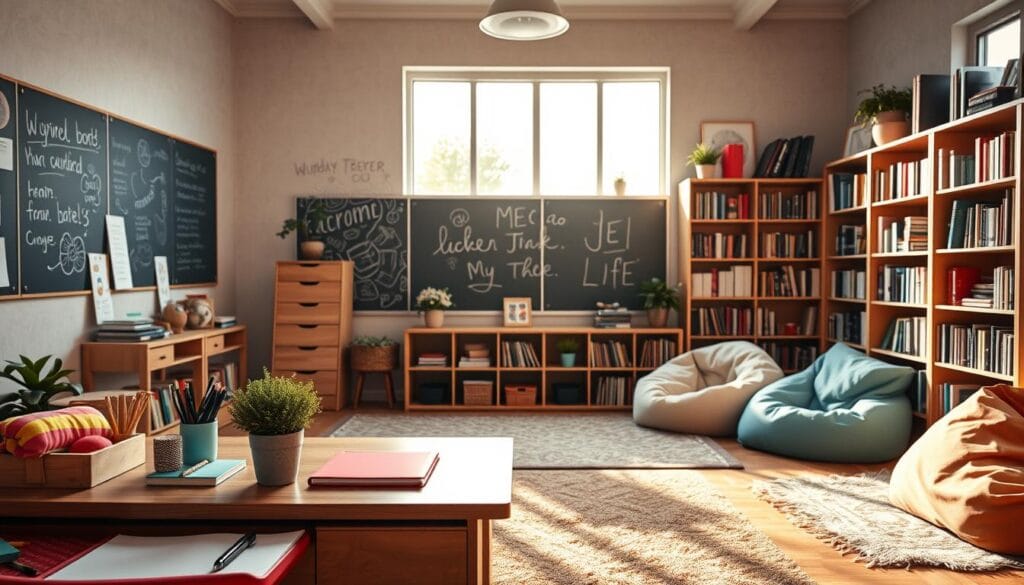
Displaying Achievements and Goals
Showing off achievements and goals is another great way to personalize your space. It motivates students by celebrating their wins and pushing them to reach their goals. Here are some ideas:
- Achievement Boards: Make boards to show off student achievements, like awards, sports wins, or art wins!
- Goal Setting Displays: Set up a display for students to set and track their goals. This makes tracking progress more fun!
- Progress Charts: Use charts to show how students are improving over time. Seeing their growth can really motivate them!
By adding these personal touches, you can make a learning space that looks good and feels supportive. The goal is to make it feel personal and celebratory, showing off the unique spirit of the students and the educational community!
Plan Seasonal Decor Changes
Changing your decor with the seasons keeps your learning space fresh and fun all year. It makes the environment exciting and lets students or kids learn about different seasons. They can help pick out decorations, teaching them about each season’s unique traits.

Adapting Decor for Fall and Winter
When fall comes, add warm, cozy touches like orange and red leaves, pumpkins, and throw blankets in warm colors. For winter, switch to blues and whites for a calm look. Add snowflakes, pinecones, and evergreen branches to make it feel serene.
Want to know when to decorate for each season? Check out our guide on when to decorate for each season.
Special Back-to-School Theming
Back-to-school is a perfect time to update your classroom or study area with learning-themed decor. Use educational posters, colorful rugs, and organized storage that looks good and works well. Kids can help make DIY projects like welcome signs or pencil holders, making the space feel special and fun.
- Use bright colors and motivational quotes to create an inspiring environment.
- Incorporate themed storage bins and baskets to keep supplies organized.
- Display student artwork and achievements to personalize the space.
Incorporate Technology
Creating a tech-friendly classroom is more than just installing devices. It also means setting up efficient charging stations and organizing cables well. As we add technology to our learning spaces, we must think about how to keep devices charged and organized all day.
Charging Stations for Gadgets
A well-designed charging station can change the game for classrooms with many devices. Here are some charging station ideas to think about:
- Use a cart with locking wheels to secure devices and keep them charged.
- Install wall-mounted charging stations to save floor space.
- Opt for a charging station with multiple USB ports to charge several devices at once.
For more ideas on technology-themed classroom decor, check out this Pinterest pin!
Organizing Cables and Accessories
Cable organization is key for a clutter-free and efficient learning space. Here are some tips for organizing cables and accessories:
- Use cable ties or zip ties to keep cables neatly bundled.
- Label cables with their corresponding devices to avoid confusion.
- Store accessories like headphones and adapters in designated bins or containers.
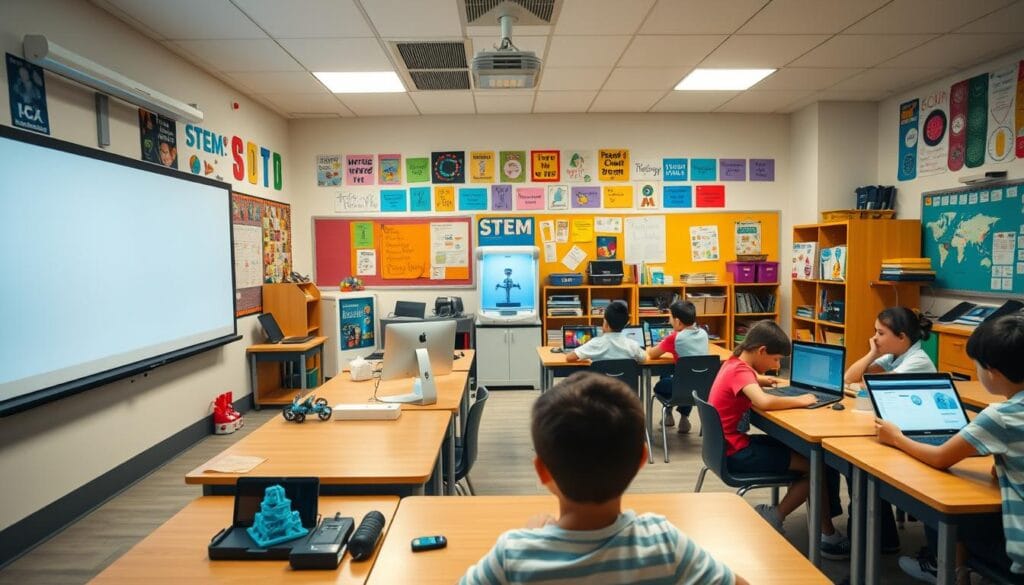
By using these strategies, we can make a classroom that is not only tech-integrated but also organized and good for learning.
Involve Kids in the Process
Getting your kids involved in organizing can be fun for everyone. It teaches them to take care of their space and feel responsible. They learn important skills through DIY projects and organization lessons.
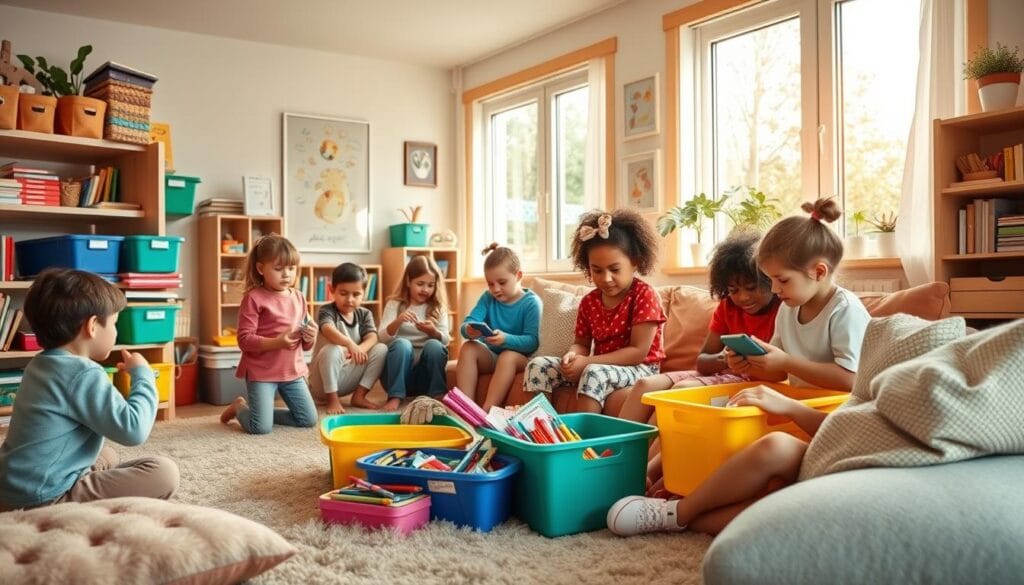
Fun DIY Projects Together
Doing DIY projects together is a great way to bond and make your home more organized. Here are some fun ideas to start:
- Decorate storage bins and baskets together
- Create a customized bulletin board for school reminders and achievements
- Make a DIY desk organizer using recycled materials
These projects boost creativity and teamwork. They also teach your kids about keeping things organized.
Teaching Organization Skills
Teaching your kids to organize is key to their growth. Here are some tips to begin:
- Start with simple tasks like sorting toys and clothes
- Use labeled bins and baskets to help them understand categorization
- Encourage them to put away their belongings after playtime
By teaching your kids these skills, you’re giving them valuable life skills. These skills will help them for many years.
Keep It Functional Yet Fun
As we start the new school year, finding the right balance is key. A well-designed learning space can really help students focus and learn better. Let’s look at how to make a space that’s both functional and fun.
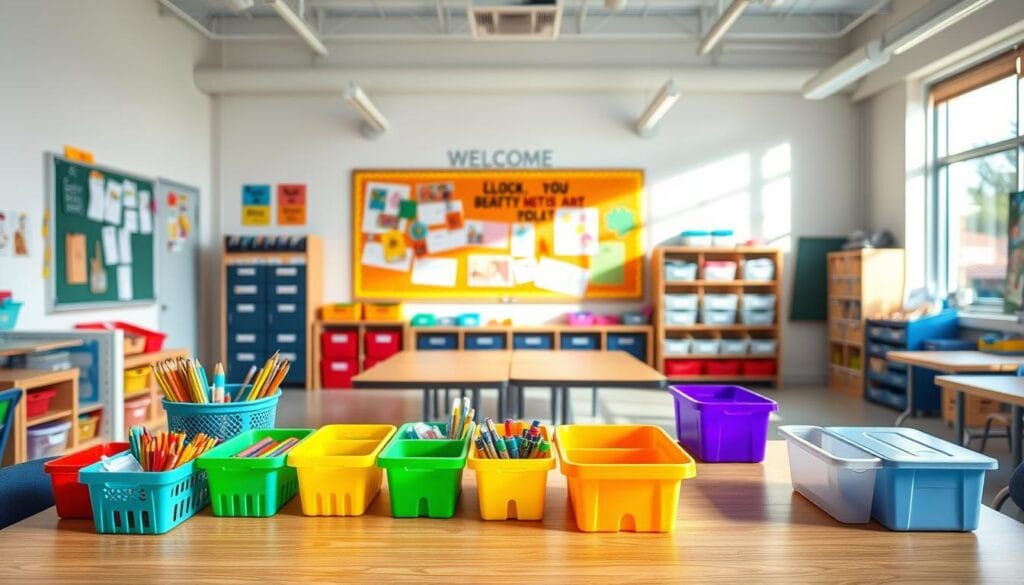
Balancing Aesthetics and Practicality
Designing a learning space means thinking about both looks and use. Pick decor that looks good and is useful. For example, colorful storage bins can brighten up the room and keep things tidy.
Here are some tips to balance both:
- Choose decor that also holds things, like baskets or shelves.
- Go for a color scheme that’s calming yet exciting.
- Bring in textures and patterns to make the space richer.
Ideas for an Inviting Learning Space
Making a learning space welcoming is about creating a place that sparks creativity and productivity. Here are some ideas to start:
- Add plants or a vase with fresh flowers for a natural feel.
- Hang up inspirational quotes or posters to motivate learning.
- Include cozy spots for reading or group work.
By using these ideas, you can make a space that’s both inviting and effective. The goal is to find a balance between looks and use, making your space both enjoyable and practical.
Regular Decluttering Routines
Decluttering regularly is more than just tidying up. It’s about making a space that encourages learning and creativity. By adding decluttering to your routine, you keep your area organized and clutter-free. This helps you reach your academic goals.
Setting Up a Weekly Cleanup Schedule
To make decluttering a habit, create a weekly cleanup schedule. Pick a day and time each week that fits your life. It could be every Sunday evening or Wednesday morning. Consistency is key to keeping your space clutter-free.
Here are some tips to make your weekly cleanup more effective:
- Start with a small area, like your desk or a single shelf.
- Sort items into categories: keep, donate, and discard.
- Use storage bins or baskets to keep items organized.
Choosing What to Keep and What to Toss
Deciding what to keep and what to discard is tough, but it’s vital. Ask yourself: When was the last time I used this item? or Does it have sentimental value? Be honest, and let go of items that don’t serve a purpose anymore.
To make decisions easier, consider these tips:
- Keep items that are frequently used or have significant sentimental value.
- Donate or recycle items that are still in good condition but no longer needed.
- Discard items that are broken, outdated, or no longer useful.
By being intentional about what you keep and what you let go of, you create a space that’s both functional and enjoyable.
Celebrate Small Wins
As we get our spaces ready for the new school year, let’s celebrate the small wins. Celebrating achievements, no matter how small, boosts kids’ motivation.
Using a reward system, like a reward board, is a great way to motivate them. A reward board tracks progress and achievements. It gives kids a sense of pride in their work. You can make one with your kids, setting goals and rewards together.
Tracking Progress
Setting monthly goals is also key. It helps kids work towards and achieve their goals. Celebrating their success together boosts their confidence and shows the value of hard work.
By adding reward systems and goal setting to your daily routine, you create a positive environment. It encourages kids to aim for their best.
